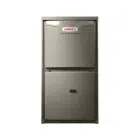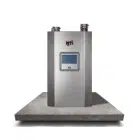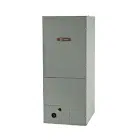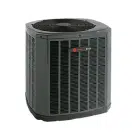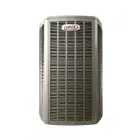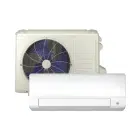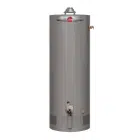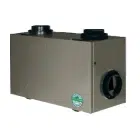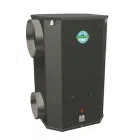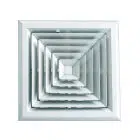
Table of Contents
Selecting the right air conditioner (AC) is crucial for maintaining comfort and efficiency in your home or office. One of the most critical factors to consider when choosing an AC unit is its BTU rating. This guide will explain what BTU means, why it’s important for AC units, how to calculate the necessary BTU for your space, and how to select the optimal AC unit based on BTU. By understanding these concepts, you can ensure that your AC unit performs effectively, provides maximum comfort, and operates efficiently.
BTU: Meaning
BTU stands for British Thermal Unit. It is a unit of measurement for heat energy. One BTU is the amount of heat required to raise the temperature of one pound of water by one degree Fahrenheit. In the context of air conditioning, BTU measures the amount of heat an AC unit can remove from a space per hour. For example, an AC unit with a rating of 10,000 BTUs can remove 10,000 BTUs of heat from the air each hour.
Understanding BTU is essential because it directly relates to the cooling capacity of an AC unit. The higher the British Thermal Unit rating, the more powerful the AC unit is at cooling a space. However, bigger is not always better; selecting an AC unit with the appropriate BTU rating for your specific needs is crucial for optimal performance and energy efficiency.
Why Is BTU in Air Conditioner Important?
BTU is a critical factor in determining the performance and efficiency of an AC unit. Here are several reasons why BTU in air conditioner is important:
- Cooling Efficiency: An AC unit with the correct BTU rating for your space will cool the area efficiently. If the BTU rating is too low, the unit will struggle to cool the space, running continuously and increasing energy consumption. Conversely, if the BTU rating is too high, the unit will cool the space too quickly, resulting in short cycling, which can lead to increased wear and tear and decreased dehumidification.
- Energy Consumption: Properly sized AC units consume less energy. An undersized unit will run constantly, using more electricity and driving up energy bills. An oversized unit will cycle on and off frequently, which also wastes energy and increases costs.
- Comfort: An appropriately sized AC unit ensures consistent and comfortable temperatures. A unit with the correct BTU rating will maintain the desired temperature without creating hot or cold spots.
- Longevity: Correctly sizing an AC unit can extend its lifespan. An undersized unit will be overworked, leading to faster wear and tear. An oversized unit will undergo frequent cycling, which can also reduce its lifespan.
Check out how to find the right air conditioner size for your home in our previous article via the link below.
https://thehvacservice.ca/how-to-find-the-correct-air-conditioner-size-for-my-home/
How to Calculate the Necessary BTU for Your Space

Determining the appropriate British Thermal Unit rating for your AC unit involves considering several factors related to the characteristics of the space you need to cool. Here’s a step-by-step guide to calculating the necessary BTU for your space:
- Measure the Area: Calculate the square footage of the room or area you need to cool. Measure the length and width of the space in feet and multiply these dimensions to get the total square footage (Length x Width = Square Footage).
- Consider Ceiling Height: Standard room height is typically around 8 feet. If your ceilings are higher than 8 feet, you’ll need a higher BTU rating to account for the additional air volume. For each additional foot of ceiling height, add 10% to the BTU calculation.
- Evaluate Insulation: The level of insulation in your space affects the cooling load. Well-insulated spaces retain cool air better, reducing the required BTU rating. Conversely, poorly insulated spaces will require a higher BTU rating.
- Count Windows and Sun Exposure: Windows can significantly impact the cooling load due to heat gain from sunlight. Count the number of windows and consider their size and exposure to direct sunlight. Rooms with large, sun-facing windows will require more BTUs to maintain comfortable temperatures.
- Account for Occupants and Appliances: People and appliances generate heat, which can increase the cooling load. For each additional person regularly occupying the space, add approximately 600 BTUs. Similarly, consider the heat output of appliances like computers, ovens, and lights.
- Adjust for Climate: The local climate also affects the cooling load. Hotter climates require higher BTU ratings compared to milder climates.
Need some help calculating the right BTU for your space? Contact HVAC Service Solutions via the link below for a professional consultation.
Advantages of Choosing an AC Unit with the Right BTU Rating
Choosing a new air conditioner in Canada with the correct BTU rating has several advantages:
- Efficient Cooling and Comfort: A unit with the right BTU rating will cool the space evenly and maintain a consistent temperature, ensuring maximum comfort without hot or cold spots.
- Energy Savings: An appropriately sized unit operates efficiently, using less energy and lowering utility bills. It avoids the energy wastage associated with both underperforming and overperforming units.
- Longer Lifespan: Properly sized units experience less wear and tear. They don’t need to work as hard or cycle as frequently, which extends their operational life.
- Improved Humidity Control: Properly sized units run for longer cycles, which enhances dehumidification. This is particularly important in humid climates, where controlling moisture levels is essential for comfort and preventing mold growth.
- Reduced Maintenance Costs: Units that are appropriately sized require less maintenance and experience fewer breakdowns. This translates to lower repair costs and fewer service calls over the unit’s lifespan.
How to Choose an AC Unit with Optimal BTU for Your Home or Office

For Homes and Apartments
- Room Size: Match the BTU rating to the size of each room. Use the calculation method described earlier to determine the appropriate BTU rating for individual rooms or open-concept areas.
- Room Usage: Consider how each room is used. Bedrooms typically require lower BTU ratings compared to kitchens or living rooms, which generate more heat from appliances and occupants.
- Multi-Room Solutions: For cooling multiple rooms, consider a ductless mini-split system, which allows for individual control of temperatures in different zones. Each indoor unit can be sized according to the specific room’s requirements.
For Offices
- Office Layout: Open-plan offices may require higher BTU ratings due to the larger space and the heat generated by multiple occupants and office equipment.
- Server Rooms: Areas with high heat-generating equipment, such as server rooms, need specialized cooling solutions with higher BTU ratings to manage the additional heat load.
- Meeting Rooms: These rooms may need higher BTU ratings during peak usage times when occupied by multiple people.
Commercial Spaces
- Retail Stores: Customer traffic, lighting, and display equipment can increase the cooling load. Ensure the BTU rating accounts for these factors.
- Restaurants and Kitchens: These spaces generate significant heat from cooking equipment and need robust cooling systems with higher BTU ratings to maintain comfort.
Conclusion
Understanding BTU and selecting the right AC unit based on its BTU rating is crucial for achieving optimal comfort, efficiency, and cost-effectiveness. By following the guidelines and calculation methods outlined in this guide, you can ensure that your AC unit is properly sized for your space, providing consistent cooling and energy savings.
Our company, HVAC Service Solutions, is here to assist you in choosing and installing the ideal air conditioning system for your home or office. Contact us today for expert advice and professional service tailored to your specific needs.
Frequent Asked Questions
What exactly does BTU stand for and why is it important for air conditioners?
BTU stands for British Thermal Unit. It is important for air conditioners because it measures the amount of heat the unit can remove from a space per hour. The BTU rating helps determine the cooling capacity of the AC unit, ensuring it can adequately cool the intended area. A correct BTU rating means the air conditioner can efficiently maintain a comfortable temperature without overworking. If the BTU rating is too low, the unit will struggle to cool the room, leading to higher energy consumption and potential breakdowns. Conversely, an excessively high BTU rating can result in short cycling, where the AC turns on and off frequently, causing inefficient operation and wear. Understanding BTU meaning is essential for choosing an air conditioner that fits your needs and ensures comfort and efficiency.
How do I calculate the BTU needed for my room?
To calculate the BTU needed, start by measuring the square footage of your room. Multiply the length and width to get the area in square feet. Next, consider the ceiling height; higher ceilings require more BTUs. Evaluate the insulation of your space: well-insulated rooms need fewer BTUs, while poorly insulated ones need more. Count the windows and their exposure to sunlight, as more windows and direct sunlight increase the BTU requirement. Consider the number of occupants and the heat produced by appliances; add approximately 600 BTUs per person and account for heat-generating devices. Lastly, adjust for climate if you live in a particularly hot or cold area. This comprehensive approach ensures you understand the BTU meaning in the context of your specific cooling needs.
What happens if I choose an air conditioner with too low of a BTU rating?
Choosing an air conditioner with a BTU rating that is too low can lead to several issues. The unit will run continuously as it struggles to reach the desired temperature, which increases energy consumption and leads to higher electricity bills. This constant operation also causes faster wear and tear, reducing the lifespan of the unit. Additionally, an underpowered AC will fail to cool the room adequately, resulting in discomfort during hot weather. It may also cause uneven cooling, with some areas of the room remaining warmer than others. The lack of sufficient cooling capacity can also stress the unit’s components, leading to frequent breakdowns and costly repairs. Understanding the correct BTU meaning is crucial to avoid these problems and ensure efficient cooling.
What are the consequences of selecting an AC unit with too high of a BTU rating?
Selecting an AC unit with a BTU rating that is too high can result in inefficiency and discomfort. An oversized unit will cool the room too quickly, leading to short cycling, where the AC turns on and off frequently. This short cycling prevents the unit from running long enough to dehumidify the air properly, resulting in a cold but clammy environment. Additionally, the frequent cycling on and off increases wear and tear on the system, potentially shortening its lifespan. The rapid cooling and frequent stops also waste energy, leading to higher electricity bills. Furthermore, an oversized unit can create temperature swings, causing discomfort as the room alternates between too cool and not cool enough. Understanding the BTU meaning and selecting the appropriate size is essential for maintaining a comfortable and energy-efficient environment.
How does ceiling height affect the BTU requirement for my space?
Ceiling height significantly impacts the BTU requirement because it affects the volume of air that needs to be cooled. Standard rooms with 8-foot ceilings have a typical cooling load. However, rooms with higher ceilings have more air volume, requiring more BTUs to cool the additional space effectively. For every additional foot of ceiling height above 8 feet, it is recommended to increase the BTU calculation by about 10%. This adjustment ensures the AC unit can handle the larger volume of air and maintain a consistent temperature throughout the room. Ignoring ceiling height can lead to underestimating the cooling load, resulting in insufficient cooling. Understanding BTU meaning in the context of ceiling height is crucial for selecting the right AC unit and ensuring efficient cooling.
Why is insulation important when determining BTU needs?
Insulation plays a vital role in determining the BTU needs of your space because it affects how well your home retains cool air. Well-insulated spaces prevent cool air from escaping and reduce heat gain from the outside, which lowers the BTU requirement. Conversely, poorly insulated spaces allow cool air to escape and let more heat in, increasing the BTU rating needed to maintain a comfortable temperature. Proper insulation reduces the workload on your AC unit, leading to more efficient operation and lower energy bills. It also helps in maintaining a consistent temperature, preventing hot or cold spots within the room. Therefore, understanding the BTU meaning and accounting for insulation quality is essential for calculating the correct cooling capacity. Improving insulation can also enhance overall energy efficiency and comfort in your home.
How do windows and sun exposure impact the BTU calculation?
Windows and sun exposure significantly impact the BTU calculation because they contribute to heat gain in a room. Large windows or multiple windows allow more sunlight to enter, raising the temperature inside and increasing the cooling load. Rooms with windows facing direct sunlight, especially during peak hours, require a higher BTU rating to offset the added heat. It is recommended to add about 10% to the BTU calculation for rooms with substantial sun exposure. Additionally, using window treatments such as blinds, curtains, or reflective films can help reduce heat gain and improve cooling efficiency. Understanding BTU meaning in relation to windows and sun exposure helps in accurately sizing your AC unit. Properly accounting for these factors ensures that your air conditioner can effectively cool the space, maintaining comfort and efficiency.
Do I need a different BTU rating for different types of rooms?
Yes, different types of rooms may require different BTU ratings due to variations in usage, occupancy, and heat generation. For instance, kitchens typically need higher BTU ratings because of the heat produced by cooking appliances. Living rooms with multiple occupants and electronic devices also generate more heat, requiring a higher BTU rating. Bedrooms, on the other hand, usually need fewer BTUs as they are smaller and have fewer heat-generating activities. Additionally, rooms with poor insulation, large windows, or high ceilings will require adjustments to the BTU calculation. Understanding the BTU meaning and how it applies to different rooms helps in selecting the right AC unit for each space. This ensures efficient cooling, comfort, and energy savings throughout your home or office.
Can HVAC Service Solutions help me choose the right BTU rating for my space?
Absolutely. HVAC Service Solutions can provide expert assistance in determining the right BTU rating for your space. Our team will conduct a thorough assessment, considering factors such as room size, ceiling height, insulation quality, window placement, and occupancy. We use this detailed analysis to calculate the appropriate BTU rating, ensuring your AC unit is neither under nor oversized. This personalized approach helps in achieving optimal cooling efficiency, comfort, and energy savings. Additionally, we offer professional installation services to ensure your unit operates at peak performance. Understanding the BTU meaning is crucial, and our expertise can guide you in making the best choice for your cooling needs. Contact HVAC Service Solutions for a consultation and let us help you find the perfect AC unit for your home or office.
How can I improve the energy efficiency of my air conditioner?
Improving the energy efficiency of your air conditioner involves several steps. First, ensure your AC unit is correctly sized with the appropriate BTU rating for your space. Regular maintenance, such as cleaning or replacing filters, checking refrigerant levels, and inspecting the unit for any issues, is crucial for efficient operation. Upgrading to a programmable thermostat can help regulate temperatures more effectively, reducing energy consumption. Improving insulation and sealing any air leaks in your home can prevent cool air from escaping and reduce the workload on your AC. Additionally, using energy-efficient models with higher SEER (Seasonal Energy Efficiency Ratio) ratings can significantly lower energy usage. Understanding BTU meaning and how it affects efficiency is essential for optimizing your cooling system. By following these tips and consulting with professionals like HVAC Service Solutions, you can enhance the efficiency and longevity of your air conditioner.
Share

